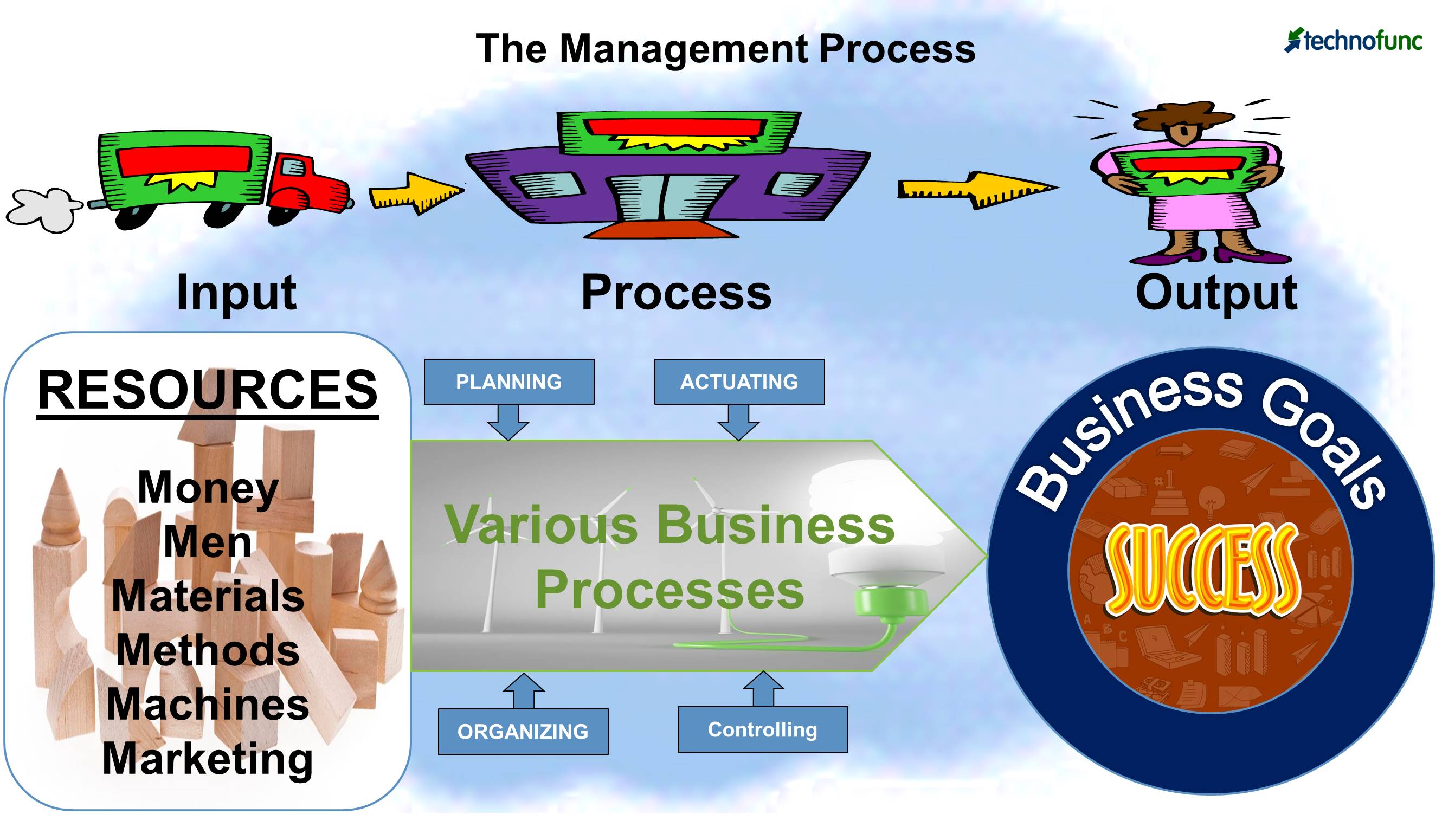- Home
- Business Processes
- Industry Knowledge
- Aerospace Industry
- Automotive Industry
- Banking Domain
- BFSI Industry
- Consumer/ FMCG Industry
- Chemicals Industry
- Engineering & Construction
- Energy Industry
- Education Domain
- Finance Domain
- Hospitality Domain
- Healthcare Industry
- Insurance Domain
- Retail Industry
- Travel and Tourism Domain
- Telecom Industry
- Leadership Skills
- eLearning
- Home
- Leadership
- Decision Making
- Concept of Management
Concept of Management
The concept of management refers to the process of planning, organizing, staffing, directing, coordinating, and controlling to achieve organizational goals. It is the management of human, physical, financial, and other valuable resources of the organization in an effective and efficient manner to achieve business objectives.
Different people have conceived and defined management in different ways. But, the essence of management lies in determining worthwhile goals and then carefully selecting and utilizing resources through efficient and effective planning, organizing, actuating, and controlling to achieve those goals.
Who is a Manager?
You are a manager. What does this mean? The word derives from the ancient French word for handling horses and a later one for handling the affairs of the kitchen. Cynics might replace horses with donkey, but all would see the analogy of keeping an organization alive through the activities of the kitchen. Probably the one that is most simple, popular, and often quoted by many in general is "getting things done through other people."
Let us now look at different definitions that highlight important aspects of management.
- Management is a distinct process consisting of activities of planning, organizing, actuating and controlling, performed to determine and to accomplish stated objectives with the use of human beings and other resources (Martin, 1977).
- Good management is merely the exercise of common sense and the Golden Rule (Daniel, 1976)
- The six M’s (money, men, materials, methods, machines, and marketing) of management or the basic resources, as they are often called, are subjected to the fundamental functions of management - planning, organizing, actuating, and controlling -to achieve stated objectives.
- Management is an art struggling to become a science.
- Management science is a body of systematized knowledge accumulated and accepted with reference to the understanding of general truths concerning management.
- The art of management is a personal creative power plus skill in performance. The contemplation of problems, events, and possibilities develops personal creative power, while experience, observation, and study of results contribute to skilled performance. It other words, management art involves envisioning an orderly whole from chaotic parts, communicating the vision, and achieving the goal. It is the "art of arts" because it organizes and uses human talent (Boehringer, 1975)

From these definitions, we can infer that the principles and the techniques of management are not only applicable to the business world but they can be equally applied universally. They also find application in social, religious, charitable, and non-profit organizational contexts.
Essentially we can conclude that management is the integration of human and other resources in a manner that leads to effective utilization and harmonization of the individual efforts with organizational goals.
Suggested Reading and Resources
Related Links
You May Also Like
-
Modern Approaches to Management
The modern approaches to management look at organizational management in the current context. They take a holistic approach and look at organizations as a collection of interrelated parts influenced by both internal dynamics and also the larger external environment. These modern management theories have played a significant role in the evolution of management studies.
-
Teams are part of the modern organizational culture. Whether you are a team leader or a team member, having a better understanding of how teams work, and being able to identify where the team is in the process, is a critical part of ensuring the team is ultimately successful. Start with the basics and understand what a team is and what role they play in an organization.
-
McClelland's Theory of Needs is a human motivation theory which states that an individual's specific needs are acquired over time through our culture and life experiences. As per the three needs theory, these acquired needs significantly influence the behavior of an individual. The three main driving motivators are the needs for achievement, affiliation, and power.
-
Quantitative Theory of Management
The quantitative management approach is given by the mathematical school that recommends the use of computers and mathematical techniques to solve complex management issues and assist in the managerial decision-making process. Managers observe historical quantitative relationships and use quantitative techniques such as statistics, information models, and computer simulations to improve their decision making.
-
Team leadership theory is a recent leadership theory that does not discriminate between the leader and the other team members. The approach considers contributions from each team member to be critical for organizational success. This approach focused on the overall team effectiveness and team problems are diagnosed and action is taken to remediate weakness. This approach provides for taking corrective action when the leader deems necessary.
-
Hawthorne Studies - Leadership
The Hawthorne studies were conducted on workers at the Hawthorne plant of the Western Electric Company by Elton Mayo and Fritz Roethlisberger in the 1920s. This study established the behavioral change that happened due to an awareness of being observed, resulting in active compliance with the supposed wishes of researchers, because of special attention received, or positive response to the stimulus being introduced.
-
Power is the ability to exercise influence or control over others. Leadership involves authority and it is very important for leaders to understand what type of power they're using. The 5 Types of Power in Leadership are Coercive power, expert power, legitimate power, referent power, and reward power. Authority is the right to command and extract obedience from others. It comes from the organization and it allows the leader to use power.
-
Maslow's hierarchy of needs is a motivational theory that explains that people are motivated by five basic categories of human needs. These needs are physiological, safety, love and belonging, esteem, and self-actualization. There is a little scientific basis for this concept of a hierarchy of needs.
-
At different points in your professional career, it is helpful to identify your core values. Values are the qualities considered to be the most important guiding principles that determine the priorities in your life and greatly influence your career choices. Your career brings happiness when it is in agreement with the beliefs you have about what is important and meaningful to you. Awareness of your values will help you develop a clearer sense of what's most important to you in life.
-
The best career choices are ones that match your values. Each person has several values that are important to him. These values are highly personal and knowing them provides a clearer sense of what's most important to you in your life and career. Career values are the beliefs you consider important from a work standpoint. Values help you understand what you want from a job? Explore a few examples of work values that can influence career path and job satisfaction.
Explore Our Free Training Articles or
Sign Up to Start With Our eLearning Courses

About Us
Learning
© 2023 TechnoFunc, All Rights Reserved










